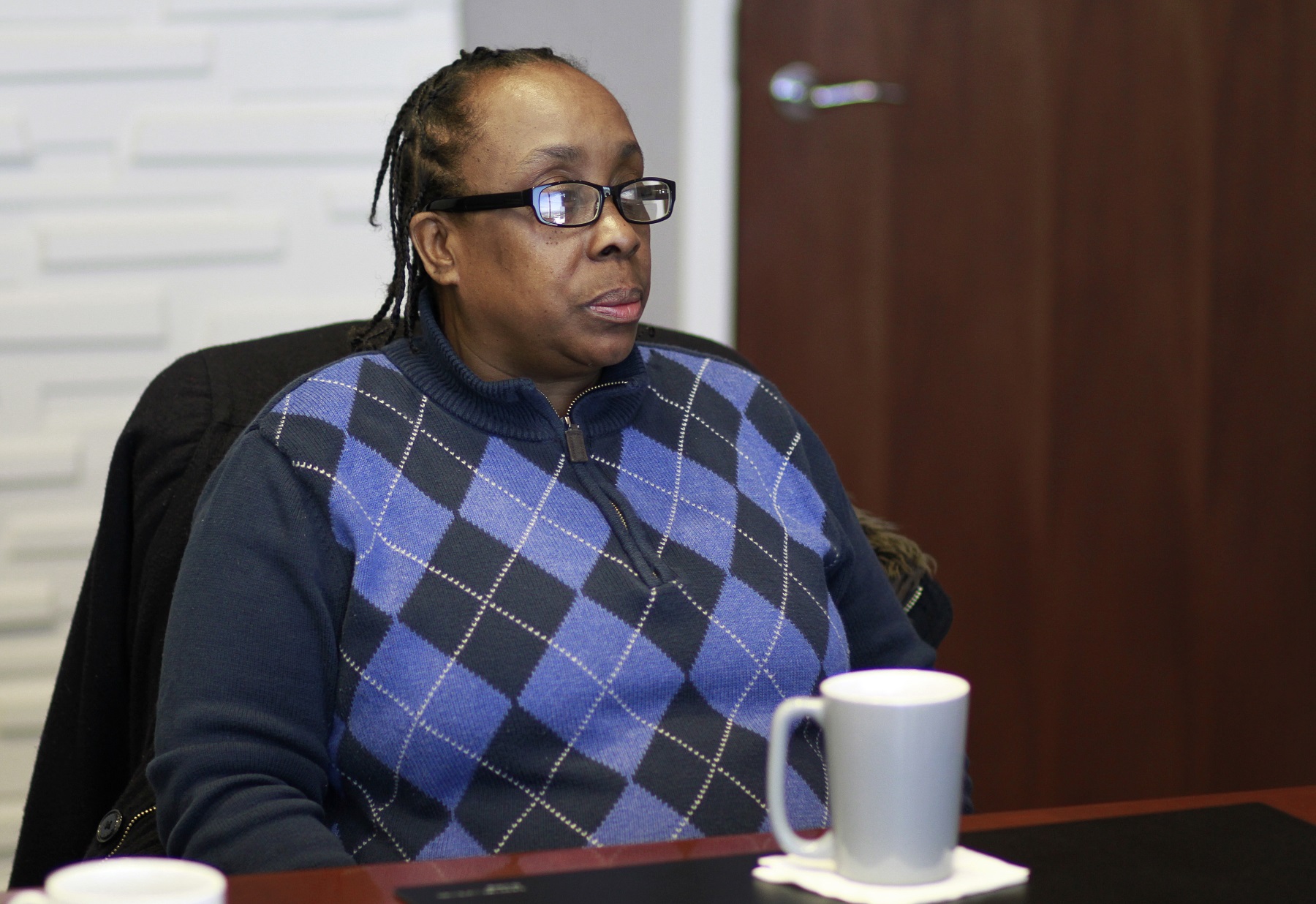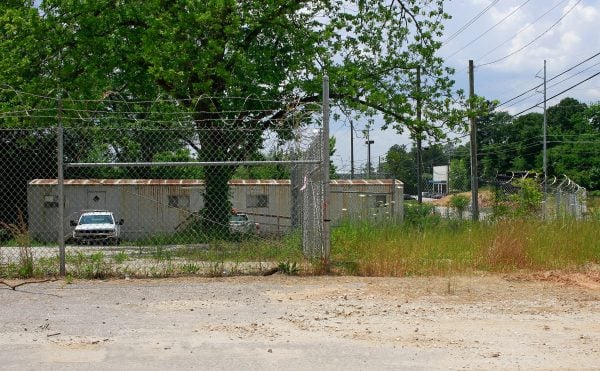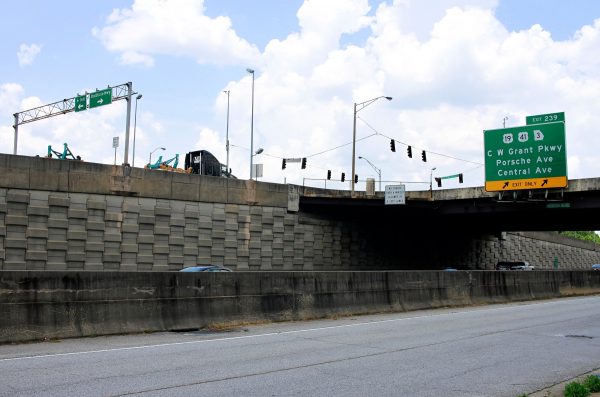GDOT, State Contractor Accused Of ‘Sexually Hostile Work Environment’

Stephanie Crater is suing the Georgia Department of Transportation and state construction contractor C.W. Matthews in federal court for maintaining a “sexually hostile work environment.” Her alleged harasser is also included in the lawsuit.
Kaitlin Kolarik / WABE
To Stephanie Crater, it was a trip with her wife to the movies about two years ago that led to months of harassment and threats at her job with the Georgia Department of Transportation.
At the theater, Crater and her wife ran into a worker with state construction contractor C.W. Matthews.
“I heard someone calling my name, and I turned around, and it was him with his two sons,” Crater said in an interview. “That was on a Friday, but that Monday when I got to work, he was there, and he started asking me questions about my personal life. That’s when it started.”
The man began harassing and threatening her at a road construction project near the Atlanta airport, according to Crater, who was a project manager with GDOT at the time. The man was a foreman for C.W. Matthews. The company was also working on the project.
WABE is not using the man’s name in this story because it was not able to substantiate Crater’s allegations.
“He fondled himself often,” Crater said. “He spoke about my needs, what he thought that he could give me that would change me.”
Crater is suing GDOT and C.W. Matthews in federal court for maintaining a “sexually hostile work environment.” Her alleged harasser is also included in the lawsuit.
Crater endured months of harassment and threats on the job, according to the lawsuit, and her bosses did not protect her.
The man never groped or touched Crater, but one time, she said, he grabbed his crotch, and told her, “I got something that can save you from going to hell.”
Another day, she said he grabbed himself and said, “I ain’t gonna hurt you … unless you want me to.”
“What I did, “Crater said, “was I went to my managers, and I explained to them that I was being harassed … and could they remove me and reassign me.”
Crater spoke to her superiors at least five more times, but they did little. At one point, one of her superiors at GDOT expressed concern that C.W. Matthews would “come after her.”
Eventually, C.W. Matthews and GDOT even met about Crater’s complaints, and five months after the alleged harassment started, the man was removed from the project.
“Not knowing what he would do. Knowing that I was there sometimes by myself,” Crater said. “It made me feel like I was under attack.”
Georgia’s Legal Gap On Sexual Orientation Discrimination

Crater is seeking damages for emotional distress, and she wants the court to hold GDOT and C.W. Matthews accountable for discrimination based on her sexual orientation (gay) and her sex (female).
But the law in Georgia may not provide all the help Crater is looking for.
Her case reveals the limited legal options in the state for workers like her, many who are already in especially vulnerable situations.
In Georgia, there are legal protections based on an individual’s sex. For example, laws against stereotypes, like women can’t do construction work.
However, there are no legal protections in the state for being gay.
The man who allegedly harassed Crater, while grabbing his crotch, seemed to suggest he could “change” her sexual orientation.
According to Crater, the man said, “Jesus despises your kind, and you’re going to hell.”
Georgia falls in a sort of legal gap when it comes to discrimination based solely on sexual orientation.
“You know a harasser can get a free pass as long as their motivation was clearly based on sexual orientation,” said Kelly Timmons, an associate professor at the Georgia State University College of Law.
U.S courts are split on whether federal civil rights law protects against sexual orientation discrimination. The 2nd Circuit Court (Connecticut, New York, Vermont) and the 7th Circuit Court (Indiana, Illinois, Wisconsin) have recently ruled that sexual orientation is included in the word “sex” in Title VII of the Civil Rights Act of 1964.
But the 11th Circuit Court, which includes Georgia, Alabama and Florida, is the only court to have ruled the opposite: that the Civil Rights Act does not protect against sexual orientation discrimination. The U.S. Supreme Court declined to hear an appeal in that case.
Crater’s case is set to continue, in part, because her allegations also include discrimination based on her sex.
Some of the man’s comments suggest he was motivated by “animus” toward Crater’s sexual orientation, U.S. Magistrate Judge John Larkins III wrote in a recent ruling. The man’s comments “can also be understood to reflect an animus toward Plaintiff because of her sex and because she did not conform to [his] view of how a woman should act,” Larkins wrote.
Even though Crater’s case can move forward, Timmons said the judge’s ruling may still make it harder for her to win damages.
“Her ability to show discrimination and harassment is going to be significantly limited by the fact that the court will pretty much ignore the sexual orientation statements,” Timmons said.
Georgia is one of about 30 states that does not have state-level protections for being gay, something that Democratic state Rep. Karla Drenner has pushed to change for most of the last decade.
“I mean, you can get married, but you can’t go to work and feel safe because you’re allowed to be harassed and demeaned and demoralized from 8 to 5,” Drenner said. “That’s not right.”
Drenner has backed bills that set up protections just for gay state employees because, she said, many large corporations already have policies about sexual orientation.
But even her somewhat restrained idea hasn’t moved far in the Republican-controlled Legislature, which has been more concerned with the rights of people opposed to same-sex marriage.
“We’ve had these conversations the last four years around a religious freedom bill,” Drenner said. “So we have a religious freedom bill competing with discrimination against gay people. So there’s huge impasse there.”
Two of 100

C.W. Matthews may be the highest-profile contractor in the state.
Since 2010, GDOT has paid the company nearly $900 million in taxpayer dollars, according to state records available online. C.W. Matthews repaired an I-85 bridge in Atlanta after it collapsed in a fire in 2017.
Construction is an “incredibly male-dominated” field, and female construction workers, like Crater, are often exposed to mistreatment, said Andrea Johnson, senior counsel for state policy at the National Women’s Law Center.
According to the legal complaint, the man Crater said harassed her, told her: “You need to stay in a woman’s place.”
And on another day, the man said: “Why would a woman want to do this type of work? Do you think you’re a man?”
In 2017, women made up just a tenth of all construction workers in the U.S., although the percentage of women in construction appears to be on the rise.
Crater said she was one of two women on the construction site near the airport where about 100 total workers were employed.
“You know a harasser can get a free pass as long as their motivation was clearly based on sexual orientation.”
Kelly Timmons, an associate professor at the Georgia State University College of Law
“It’s a deep-seeded, macho culture within the construction industry,” said Johnson. “So all of that leads to really high levels of sexual harassment.”
Rep. Drenner expressed doubt that Crater’s incident was unique or isolated, and she wants a review of how state agencies and contractors handle harassment and discrimination.
“I would want to look more deeply and see if there was any legislative remedies or administrative remedies that needed to be instituted as a result of the case,” Drenner said.
For its part, a GDOT spokesperson said the agency “cannot comment on pending legal issues.”
“We dispute all of Ms. Crater’s allegations and will continue to vigorously defend against the lawsuit,” said Sheldon Fram, corporate counsel with C.W. Matthews. Fram declined to respond to further questions from WABE.
Lawyers for the man Crater alleges harassed her declined to comment for this story and did not make the man available for an interview.
Crater said she wants attention on the failings of GDOT and C.W. Matthews.
“When someone complains or says that they’re being treated bad, or that they’re being harassed,” Crater said, “companies need to do something about it.”








